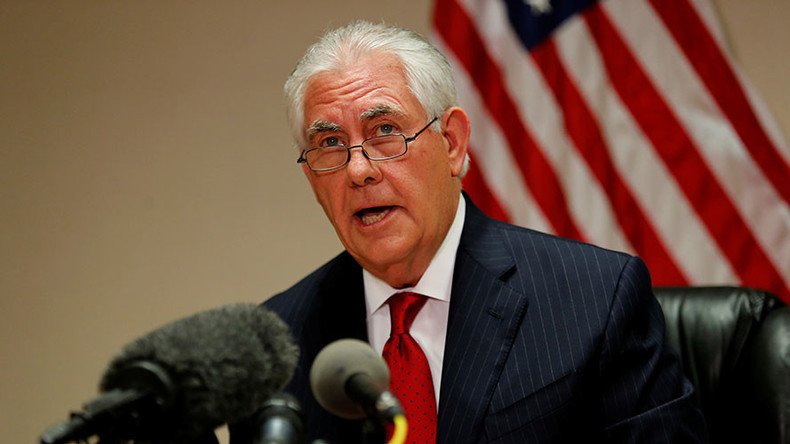‘Iran complies with nuclear deal but sponsors terrorism’ – Tillerson on Trump’s review order

President Trump has ordered a review of the Iranian nuclear deal, Rex Tillerson says. Writing in a letter that while Tehran was complying with its part of the deal, Tillerson questioned the lifting of sanctions, calling Iran “a state sponsor of terror.”
On Tuesday, US Secretary of State Rex Tillerson sent a letter to House Speaker Paul Ryan (R-Wisconsin), confirming that Iran is compliant with its commitments under the Joint Comprehensive Plan of Action (JCPOA ).
The JCPOA is an agreement signed in 2015 under former US President Barack Obama along with China, France, Germany, Russia, the UK, and the EU, to ensure that “Iran’s nuclear program will be exclusively peaceful.”
Although Tillerson said that Iran is compliant with the agreement, he questioned whether lifting sanctions was in the best interests of the US, saying that Iran “remains a leading state sponsor of terror through many platforms and methods.”
Tillerson also informed Ryan that the Trump administration will be conducting an inter-agency review of the JCPOA to “evaluate whether suspension of sanctions related to Iran pursuant to the JCPOA is vital to the national security interests of the United States,” Tillerson said in a press release from the State Department.
The JCPOA will not lift all sanctions against Iran until “transition day,” which comes eight years after the agreement was signed in 2023.
Since his presidential campaign, President Donald Trump has consistently criticized the JCPOA as “the worst deal ever negotiated,” but offered conflicting opinions on whether he would try to scrap it, renegotiate its terms, or keep it in place.
The review will evaluate whether the suspension of sanctions on Iran under the agreement “are in the vital interest of our national security” and “to make sure that they’re living up to their agreement,” White House press secretary Sean Spicer said on Wednesday. When asked if Trump thinks that Iran is “cheating” on the deal, Spicer said: “If he didn’t, if he thought that everything was fine, he would have allowed this to move forward. I think he’s doing the prudent thing by asking for a review of the current deal.”
The nuclear deal was signed by Iran and the major world powers – the US, France, Britain, Russia, and China, plus Germany – in July 2015, following 18 months of intense multilateral negotiations. Under the deal, which took effect in January 2016, Iran agreed to restrain its nuclear program in exchange for the removal of economic and financial sanctions.
Opponents of the nuclear deal, however, including Israel and its allies in the US Congress, still accuse Tehran of seeking to develop nuclear weapons, which Iran denies. It also warns that any US violation of the nuclear deal would leave Tehran with no choice but to withdraw its commitments under the JCPOA.
READ MORE: Politicians upset over Boeing deal with Iran
Iran’s obligations include reducing the number of centrifuges by two-thirds, so that uranium enrichment is kept well below the level needed to produce weapons-grade material. Tehran has also agreed to reduce its enriched uranium stockpile from around 10,000kg to 300kg for 15 years, and submitted to international inspections to verify its compliance.
In March, US Secretary of Defense James Mattis claimed that Iran continues to behave as an “exporter of terrorism” and still sponsors militant activity. Bahram Qassemi, spokesman for the Iranian Foreign Ministry, told Mattis to stop making such “unwarranted and malicious accusations against Iran.”













